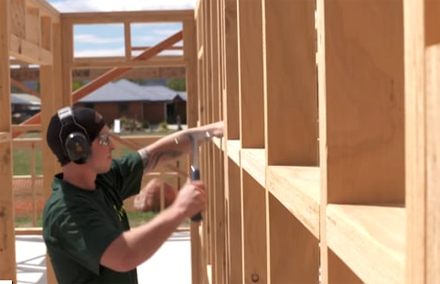New data released from the National Centre for Vocational Education and Research shows building and construction apprenticeship commencements have fallen 22% in the year to December 2023. Source: Timberbiz
Only 41,935 people commenced a building and construction-related apprenticeship in 2023, down from 54,035.
In response, Master Builders Australia is releasing the Future of the workforce: apprentices in building and construction report, which shows it will take a village to ensure Australia attracts and retains our next generation of trade apprentices.
The report highlights some of the barriers impacting the industry’s ability to attract and retain apprentices and puts forward a holistic list of recommendations to reverse this trend.
“Despite a sizeable workforce of over 1.35 million people, the industry is facing acute shortages with an annual exit rate of 8%, of which we are currently only replacing half of that rate,” CEO Denita Wawn said.
“Prolonged construction labour shortages will lead to a $57 billion reduction in Australia’s GDP over the next five years.
“The role of improving our domestic pipeline of workers is critical to overcoming the housing crisis.
“For decades, we have seen the cultural erosion of trade apprenticeships with students being pushed towards the university system,” she said.
“Apprentices are paid to learn, unlike their higher education counterparts who pay to learn.
“VET and higher education are both integral parts of Australia’s education system and should be viewed as such.
“It will take a concerted effort by governments, industry, schools and the broader community to turn this ship around.
“The Federal Government made a range of positive announcements aimed at attracting more apprentices into the building and construction industry in the recent Budget.
“We would like to see these measures expanded with stronger support from states and territories,” Ms Wawn said.
Recommendations include:
- Promoting varied and rewarding pathways to school-aged students, their parents and careers advisers.
- Overhauling the funding for and quality of careers education in schools.
- Investing in programs that provide clear and practical information on what an apprenticeship and future career pathway in the industry could be.
- Supporting schools to adopt better integrated vocational education and training into the school curriculum especially in early high-school years.
- Encouraging secondary school students to undertake their White Card training.
- Expanding support for women in building and construction programs.
- Reintroducing an incentive system with commencement and completion bonuses to apprentices and employers.
- Introducing a tiered wage subsidy that better supports mature-aged apprentices and reflects existing skill levels.
- Funding the cost differential for Group Training Organisations to host an apprentice and provide vital pastoral care services.
- Introducing incentives to encourage industry upskilling from a Certificate III to a Certificate IV.
- Ensuring funding is proportionally distributed between TAFE and industry-led Registered Training Organisations.
- Reviewing the restrictive nature of Modern Awards and pattern Enterprise Bargaining Agreements on flexible work arrangements.







